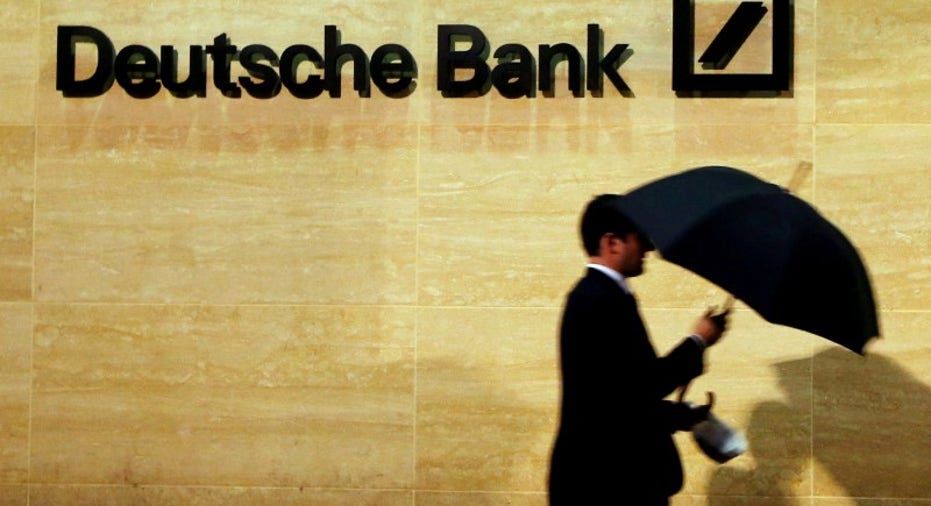German hard line on Italy may rebound with Deutsche in crisis

FRANKFURT – Germany's insistence that Italy accept tough conditions in tackling its problem lenders may rebound now that Berlin faces a banking crisis of its own.
After months of argument over how to deal with bad debts in the Italian financial system, Deutsche Bank instead took center stage on Friday, with its share price near record lows and its chief executive trying to reassure staff and markets that Germany's biggest bank remains robust.
For many in Italy, including Prime Minister Matteo Renzi, this diverted attention from the country's own difficulties in recapitalising the likes of Banca Monte dei Paschi di Siena.
Renzi went easy on expressing any Schadenfreude on Friday, but knocked the ball back into the German court. "We have always said that the European Union has to do everything in its power to fix the problems of the banking sector and the main worry focuses on the German lenders," he told national broadcaster RAI.
He is not alone. The International Monetary Fund has named Deutsche as a bigger potential risk to the wider financial system than any other global bank.
With Monte dei Paschi struggling to persuade investors to back its third recapitalization in as many years, Economy minister Pier Carlo Padoan acknowledged Italy had to get its own house in order, but not in isolation.
"Just like the problem of bad bank loans must be solved within a reasonable time frame, so it should be for Deutsche Bank's problems," he told La Stampa newspaper.
Rome and Berlin have been at odds for months over demands that Italian savers should shoulder the burden of a rescue of Monte dei Paschi, Italy's third biggest and oldest bank.
Rome had tried to shield institutional investors and ordinary Italians who put their savings into the bank's bonds, while Berlin had wanted them to suffer losses as a condition for allowing state support.
An official familiar with the German government's stance, had told Reuters it wanted to prevent Italy tapping European funds to solve its banking problems, a move that would mean Berlin footing part of the bill.
Germany points out that while the Italian government is saddled with heavy debts, citizens' personal savings are high, meaning private investors should play a role in bank rescues. "The state is poor," said the official. "The Italians are rich."
Renzi's government opposes such a step, fearing it would be unpopular before a referendum on constitutional reform in December.
'SOFTER LINE'
Although Germany is far stronger economically than Italy, Deutsche Bank's great size poses a greater problem than any individual Italian lender.
As they prepare for national elections in 2017, politicians in Berlin also oppose any state bailout of Deutsche, a bank unpopular among many voters because of its aggressive expansion on Wall Street that resulted in billions of euros of fines.
The possibility that Deutsche could run short of capital if it is overwhelmed by penalties puts Berlin in a more vulnerable position than before, possibly undermining any push for a tough solution for Italy.
"They have taken a very doctrinaire line with the Italians," said Simon Tilford of the Centre for European Reform, a London-based think tank. "Maybe this gives Germany cover to soften their line."
While final approval for state aid for banks lies with the European Commission, Germany's position, as the euro zone's largest economy, is nonetheless important.
Throughout the euro zone debt crisis, Berlin tried to insulate its lenders and citizens alike from the problems of countries such as Greece. This caused ill feeling in states that were forced into bailouts as well as in some, like Italy, that did not need one.
Tilford believes that an amicable end to the tensions between Germany and Italy is now important both for tackling the banking problems and for the unity of the 19-member euro currency area.
"What Germany has sought to do since the start of the crisis is avoid any costs to its banks or taxpayers," he said. "The big fault line in the euro zone is between Italy and Germany."
Others believe, however, that even the problems at Deutsche will do little to change Germany, which has lectured other European countries on how to manage their economies and finances better throughout the debt crisis.
"Deutsche Bank is embarrassing," said Sven Giegold, a German member of the European Parliament, adding, however, that he did not expect Germany to change its general stance. "German arrogance is more deeply rooted than that."
(Additional reporting by Francesca Piscioneri in Rome; editing by David Stamp)



















